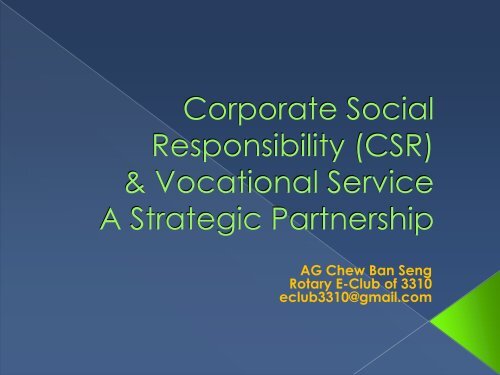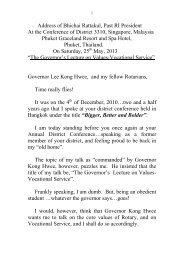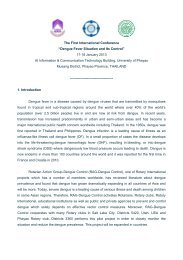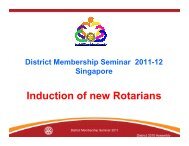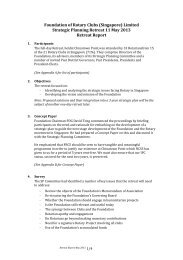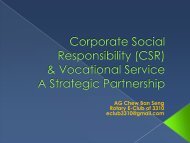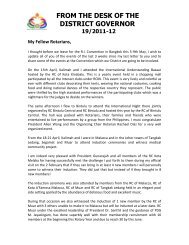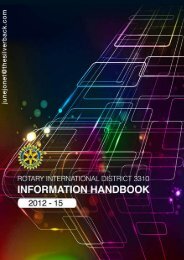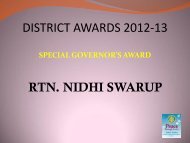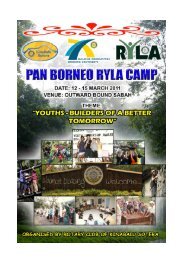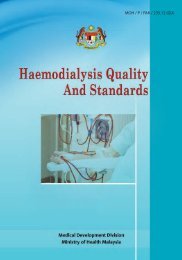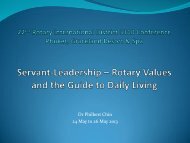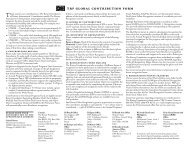Corporate Social Responsibility - Rotary International District 3310
Corporate Social Responsibility - Rotary International District 3310
Corporate Social Responsibility - Rotary International District 3310
Create successful ePaper yourself
Turn your PDF publications into a flip-book with our unique Google optimized e-Paper software.
<strong>Corporate</strong> <strong>Social</strong><br />
<strong>Responsibility</strong> (CSR)<br />
& Vocational Service<br />
A Strategic Partnership<br />
AG Chew Ban Seng<br />
<strong>Rotary</strong> E-Club of <strong>3310</strong><br />
eclub<strong>3310</strong>@gmail.com
“In <strong>Rotary</strong>, our business is not<br />
profit. Our business is peace.<br />
Our reward is not financial,<br />
but the happiness and<br />
satisfaction of seeing a<br />
better, more peaceful world,<br />
one that we have achieved<br />
through our own efforts.”<br />
RI President 2012-2013 Sakuji Tanaka
<strong>Rotary</strong> & <strong>Corporate</strong> <strong>Social</strong><br />
<strong>Responsibility</strong> (CSR)<br />
<br />
<br />
Since inception, <strong>Rotary</strong> has built a philosophy based upon<br />
integrity in businesses and professions. These can be<br />
summed up in the Object of <strong>Rotary</strong>, our core values<br />
(Service, Fellowship, Diversity, Integrity, Leadership), The<br />
Four-Way Test, and <strong>Rotary</strong> Code of Conduct.<br />
<strong>Rotary</strong> clubs and individual Rotarians are committed to<br />
Vocational Service and high ethical standards in all of<br />
their interactions. As an organisation, <strong>Rotary</strong> <strong>International</strong>'s<br />
social responsibility philosophy can be summed up by our<br />
commitment to transparency in governance, stewardship<br />
of financial resources and the environment, and fair labour<br />
practices.
<strong>Rotary</strong> Areas of Focus<br />
The 6 Areas of Focus reflect critical humanitarian<br />
issues and needs that Rotarians are addressing<br />
worldwide. They align <strong>Rotary</strong> with other international<br />
development efforts (UN Global Compact and<br />
Millennium Development Goals of UN) that will<br />
strategically further The <strong>Rotary</strong> Foundation's mission.<br />
While the Millennium Development Goals are a key<br />
focus at the UN, both the goals and <strong>Rotary</strong>’s areas<br />
of focus aim to help others and give them hope for<br />
a better life in a better world.<br />
rotary.org/future vision<br />
rotary.org/areasoffocus
Ethical Decisions – Some<br />
Common Dilemmas<br />
Honest accounting practices<br />
<strong>Responsibility</strong> for mistakes such as accidents,<br />
spills, and faulty product<br />
Advertising that is honest and not misleading<br />
Collusion with competitors<br />
Labour issues<br />
Brides and corporate espionage
The Energy<br />
Report – 100%<br />
Renewable<br />
Energy by 2050<br />
10 Recommendations<br />
For A 100% Renewal<br />
Energy Future
The Energy Report – 100%<br />
Renewable Energy by 2050<br />
“By 2050, we could get all the energy we need from<br />
renewable sources. This report shows that such a<br />
transition is not only possible but also cost-effective,<br />
providing energy that is affordable for all and<br />
producing it in ways that can be sustained by the<br />
global economy and the planet. The transition will<br />
present significant challenges, but I hope this report<br />
will inspire governments and business to come to<br />
grips with those challenges and, at the same time, to<br />
move boldly to bring the renewable economy into<br />
reality. There is nothing more important to our ability<br />
to create a sustainable future.”<br />
James P. Leape<br />
Director General<br />
WWF <strong>International</strong>
The Energy Report – WWF<br />
<br />
<br />
100% POSSIBLE – Switching to a fully renewable energy<br />
supply by 2050 is achievable... but there are challenges<br />
to overcome.<br />
Energy derived from the sun, the wind, the Earth’s heat,<br />
water and the sea has the potential to meet the world’s<br />
electricity needs many times over, even allowing for<br />
fluctuations in supply and demand. We can greatly<br />
reduce the amount of energy we use through simple<br />
measures like insulating buildings, recycling materials and<br />
installing efficient biomass stoves. Biomass from waste,<br />
crops and forest resources has potential to provide a<br />
renewable source of energy.
<strong>Corporate</strong> <strong>Social</strong><br />
<strong>Responsibility</strong> (CSR)<br />
CSR is about sustainability and the triple bottom<br />
line – People (Community), Planet (Environment),<br />
Profits (Financials).<br />
On 7 November 2009, RI United Nations Day, an<br />
announcement was made with United Nations<br />
Global Compact to encourage joint collaboration<br />
to advance and share “the ideals of high ethical<br />
business practices, sustainable humanitarian<br />
action, and world peace and understanding.”
<strong>Social</strong> responsibility<br />
<strong>Responsibility</strong> of an organisation for the impacts<br />
of its decisions and activities on society and the<br />
environment, through transparent and ethical<br />
behaviour that:<br />
Contributes to sustainable development,<br />
including health and the welfare of society;<br />
Takes into account the expectations of<br />
stakeholders;<br />
Is in compliance with applicable law and<br />
consistent with international norms of<br />
behaviour; and<br />
Is integrated throughout the organization and<br />
practised in its relationships
Principles of social responsibility<br />
Accountability<br />
Transparency<br />
Ethical behaviour<br />
Respect for stakeholder interests<br />
Respect for the rule of law<br />
Respect for international norms of behaviour<br />
Respect for human rights
<strong>Social</strong> <strong>Responsibility</strong><br />
- ISO 26000 (7 core subjects)<br />
Organisational governance<br />
Human rights<br />
Labour practices<br />
Environment<br />
Fair operating practices<br />
Consumer issues<br />
Community involvement and development
ISO 26000<br />
offers a<br />
general<br />
framework<br />
and is a<br />
guideline,<br />
not a legally<br />
binding<br />
standard;<br />
it does not<br />
provide<br />
certification.
ISO 26000<br />
offers a<br />
general By adopting ISO 26000, companies seek not<br />
framework only to achieve financial targets but also to<br />
and take is a their governance, environmental and<br />
guideline, social issues into account.<br />
not a legally<br />
binding<br />
standard;<br />
it does not<br />
provide<br />
certification.
Benefits of <strong>Social</strong> <strong>Responsibility</strong><br />
The perception and reality of an organization's<br />
performance on social responsibility can influence,<br />
among other things:<br />
Competitive advantage<br />
Reputation<br />
Ability to attract and retain workers or members,<br />
customers, clients or users<br />
Maintenance of employees' morale, commitment<br />
and productivity<br />
View of investors, owners, donors, sponsors and the<br />
financial community<br />
Relationship with companies, governments, the<br />
media, suppliers, peers, customers and the<br />
community in which it operates
Opportunity & <strong>Responsibility</strong><br />
- Some key messages<br />
CSR is not a new concept to SMEs<br />
CSR can bring advantages to SMEs<br />
Partnerships between stakeholders are crucial<br />
Language and terminology must be appropriate<br />
Need to better integrate CSR into education<br />
Not all SMEs are the same<br />
Governments must act responsibly too<br />
CSR may look different in different countries
Responsible<br />
entrepreneurship is about<br />
running a business in a<br />
way that enhances its<br />
positive contribution to<br />
society whilst minimising<br />
the negative impacts on<br />
people and the<br />
environment. It shows the<br />
way in which<br />
entrepreneurs interact<br />
with their stakeholders on<br />
a daily basis, namely,<br />
customers and business<br />
partners in the<br />
marketplace, employees<br />
in the workplace, the<br />
local community and the<br />
environment.
Challenges for SMEs<br />
The success of CSR management systems for SMEs will<br />
be influenced in particular by:<br />
Cost. Management systems that are expensive to<br />
buy or to implement are likely to see a lower<br />
uptake.<br />
Simplicity. The best CSR management systems for<br />
SMEs will be those that are simple and not<br />
excessively time-consuming to operate.<br />
Degree of integration into other existing systems.<br />
Ideally a CSR management system for SMEs should<br />
be linked to or even integrated into other existing<br />
management systems.
Business Cases for Investing<br />
in Employee Volunteering<br />
Employee volunteering<br />
Creates employee engagement<br />
Attracts better talent<br />
Is employee development<br />
Offers a competitive advantage<br />
Increased corporate intelligence<br />
Reduces health care costs<br />
(Source: http://realizedworth.blogspot.com/2011/06/business-case-for-employee-volunteering.html)
This questionnaire helps<br />
you think about your<br />
company’s efforts<br />
towards responsible<br />
entrepreneurship by<br />
raising questions on the<br />
possible ways you could<br />
improve your business in<br />
a profitable and sensible<br />
manner. It will also help<br />
you identify further<br />
actions you can take to<br />
strengthen your business,<br />
its reputation and<br />
performance. The<br />
questionnaire explores<br />
workplace policies,<br />
environmental policies,<br />
marketplace policies,<br />
community policies, and<br />
company values.
Responsible Leadership
<strong>Social</strong> <strong>Responsibility</strong> to SMEs<br />
Responsible entrepreneurs (Rotarians):<br />
Treat customers, business partners and competitors<br />
with fairness and honesty;<br />
Care about the health, safety and general wellbeing<br />
of employees and consumers;<br />
Motivate their workforce by offering training and<br />
development opportunities;<br />
Act as ‘good citizens’ in the local community;<br />
Are respectful of natural resources and the<br />
environment.
BEST PRACTICES<br />
As a Rotarian, I recognise my role in the community. I shall<br />
<br />
<br />
<br />
<br />
<br />
Act against all forms of corruption, bribery and extortion.<br />
Promote ethical and responsible decision making and<br />
safeguard the integrity of financial reporting.<br />
Preserve and progress the legitimate interests and rights of<br />
stakeholders.<br />
Adopt a precautionary approach to environmental<br />
challenges and support initiatives that promote greater<br />
environmental responsibility.<br />
Respect and uphold the internationally proclaimed<br />
human rights for the workforce.<br />
(Responsible Rotarians, Responsible Businesses –<br />
drafted by PDG Gerald Minjoot & CP B S Chew)
<strong>Rotary</strong>’s Identity<br />
Use <strong>Rotary</strong> emblem as a<br />
mark of distinction to<br />
promote “Responsible<br />
Businesses” through<br />
the triple bottom-line<br />
(Community) People<br />
(Environment) Planet<br />
Profit (Financials)
Resources (with special reference to SMEs)<br />
Areas of Focus handouts - <strong>Rotary</strong> <strong>International</strong><br />
The Energy Report – WWF Global<br />
<strong>Social</strong> <strong>Responsibility</strong> and the Quality Professional: The Implications of<br />
ISO 26000<br />
Discovering ISO 26000<br />
Building Linkages For Competitive and Responsible Entrepreneurship<br />
Engaging Small Business in <strong>Corporate</strong> <strong>Social</strong> <strong>Responsibility</strong><br />
<strong>Social</strong> and Environmental <strong>Responsibility</strong> and the Small Business Owner<br />
Opportunity and Responsiblity - European Commission<br />
Introduction to <strong>Corporate</strong> <strong>Social</strong> <strong>Responsibility</strong> for Small & Medium-<br />
Sized Enterprises<br />
Case Studies - European Commission<br />
A guide to communicating about CSR<br />
Awareness-raising questionnaire<br />
Responsible Entreprenuership
How do you eat an elephant


